Antoine GARAPON
accueil > Intégralité des débats > SESSION 4
SESSION 4
version originale bilingue - tout en français - tout en anglais
Thème de la session : Le jugement et la peine
Vendredi 10 juillet 2009, 14h-17h30
Président : Antoine GARAPON
-
contribution 01 - GARAPON Antoine
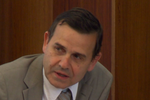
all the session in: version originale bilingue français english
tags
ICTR assessmenttranstlated version
As we address this afternoon’s session, I would like to thank the sponsors. I think this is an auspicious time at this stage of the colloquium because I believe that our meeting has something of unique, something which is peculiar. In France, I wish that in courts there would be a meeting between the prosecutors, the judges, the lawyers, witnesses, journalists, prisons, administration so that we can we can speak to each other and we can take stock of our collective performance. I believe that is the very purpose of our meeting in these choice moments. I was saying that it appears that the deliberations of yesterday and today have (...) -
contribution 02 - Roux François
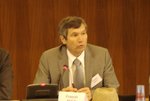
all the session in: version originale bilingue français english
François ROUX
transtlated version
Thank you. This has been a practice, a common practice for that matter, before the ICTR. It might suffice to recall that while there were not many pleas of guilty before the ICTR, we owe ourselves the truth. It is because of the failure of the plea bargain of Kambanda which scarred the detainees and who told themselves, "He pled guilty and he still was slammed a life sentence, and I do not know why I have to plead guilty in respect of my liability." So 15 years after the first pleas of guilty, nothing much happened. When I was entrusted with the Vincent Rutaganira trial, when we started talking about the possibility of pleading (...)A. GARAPON
Thank you very much. You have raised two issues. And the Kambanda issue brings to the fore the Tadic case and which is one of the challenges facing the international Tribunals which have short life spans and which between birth and both death, the time span is extremely short and complicated.
Yes, Bernard Muna
-
contribution 03 - MUNA Bernard Acho
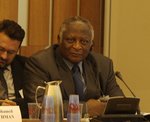
all the session in: bilingual original version français english
Bernard MUNA
original version
I wish to agree about Kambanda. Because myself and Mr. Othman worked very hard. We interviewed Kambanda many times. We did, in fact, hold out the fact that if he pleaded guilty, that would take it into consideration. We were very disappointed when our prosecutor arrived on the sentence. "Now, this is the first sentence. We have to ask for life." We tried as much as possible, myself and Othman to persuade that if we can get more people to plead guilty it would serve as an example. This is the whole point. Unfortunately we had to tow the line of our boss. I think that the position adopted later on by the Tribunal is better after us. (...)A. GARAPON
Thank you very much. I believe we will tackle that issue towards the end, the issue of reconciliation and see how far the Tribunal was caught up in some conflicting issues to highlight the gravity of the crime of genocide. And to establish collaboration and then to meet our justice.
Vincent Lurquin has the floor.
-
contribution 04 - Lurquin Vincent
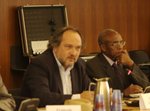
all the session in: version originale bilingue français english
tags
Accused realeasedVincent LURQUIN
transtlated version
Thank you, Mr. Chairman. I will follow up on what Mr. Roux said. If there is one thing on which everyone here is agreed, that is, that the rulings of the Tribunal have to be respected. And if decisions are not respected, then it is futile having a Tribunal. It may be scandalous or the greatest scandal of the Tribunal is that today, 10 July 2009, you have someone out there in Arusha, Ntagerura, who was acquitted on 24 February 2004. Five and a half years on, a solution has not been found. He was acquitted together with one of my clients, Emmanuel Bagambiki. For three and a half years, with the assistance of the Registrar, we (...)A. GARAPON
Thank you. Mr. Ngarambe.
-
contribution 05 - NGARAMBE Joseph
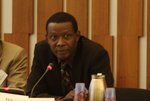
all the session in: version originale bilingue français english
Joseph NGARAMBE
transtlated version
I would like to come back on the confession, the guilty and the Kambanda trial. Mr. Muna has stated that maybe the Judges could could have now, I am talking about the Office of the Prosecutor because in November 2002, the Prosecutor sent me to go and negotiate with Kambanda in Mali because Kambanda no longer wanted to talk to a single member of the Prosecutor’s office. So the deputy Prosecutor at the time, who was serving in an acting capacity, was Mr. Michael Johnson. He asked me to try to renew contact between the Office of the Prosecutor and Kambanda. He insisted that I do so. I committed myself and did so. I called him. (...)A. GARAPON
Thank you for your testimony. I believe that the Office of the Prosecutor once again is challenged in keeping promises, keeping commitments. So maybe we should give Mr. O’Donnell the floor now.
-
contribution 06 - O’DONNELL Everard
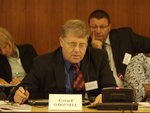
all the session in: bilingual original version français english
tags
Accused realeasedEvrard O’DONNELL
original version
Thank you, Mr. Chairman. I just wish to comment on the remarks made upon the acquitted persons. It’s very difficult to recognise what was described to you as anything similar to the truth that I know about Mr. Ntagerura and Mr. Bagambiki, because, of course, I have lived, if I may say figuratively, I have lived with them since their case led to an acquittal in February 2006. I know them very well, and I have been in charge of their circumstances, along with the Registrar. Had Mr. Ntagerura wished to go to any country in the African continent, he would have been there within a matter of weeks of his acquittal. It’s a simple fact. To (...) -
contribution 07 - AMOUSSOUGA Roland
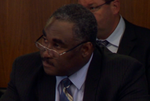
all the session in: version originale bilingue français english
Roland AMOUSSOUGA
transtlated version
Thank you, Mr. Chairman. I would like to revisit a few points. First on what Mr. Muna said. If my memory is actually serving me right, I wonder when he says that the Prosecutor, in his pleading, in his closing arguments reported asked for life imprisonment. If I remember correctly, I believe that the Prosecutor asked for a prison term of 25 years and the Defence had asked for two years. I remember the Chamber’s position clearly, especially the position of President Laity Kama who did not follow the direction chartered by the Prosecutor. The Chamber probably wanted to send out a powerful message in the sense that Kambanda was a prime (...)A. GARAPON
Thank you you are right to point out there maybe a cultural gap in the guilty plea. There is some resistance from civil law judges to factor in plea agreements, plea bargains and that kind of things which they may not want to accept. Cécile Aptel?
-
contribution 08 - APTEL Cécile
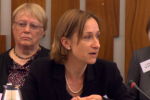
all the session in: version originale bilingue français english
Cécile APTEL
transtlated version
Thank you. Very briefly. I did not want to say something about the Kambanda case because I believe that is a difficulty we face in this symposium we don’t know what will happen to Kambanda. At some point he can start cooperating again with the OTP or with the Defence. So this is a bit special. But I just want to set the record straight. In 1998 I was there when he pleaded guilty, so I was a legal officer in Trial Chamber I with Judge Kama. So I monitored the case and I assisted the judges in drafting the judgements on that Kambanda case. Now, to restitute the facts, it was the Prosecutor who asked for a life sentence. And that (...) -
contribution 09 - MUNA Bernard Acho

all the session in: bilingual original version français english
Bernard MUNA
original version
I just want to bring out this aspect of what happened in court. This, again, was a bit of a clash between the common law system and the civil law system. In the common law system, the lawyer asks and speaks on behalf of the client. We were shocked because in the judgement of the Court the fact that he showed no remorse was mentioned, which was factually not true. Because he spoke through his counsel and his counsel pleaded for him and said that he is sorry and so forth. His counsel was his spokesman for the Accused. And in the English system, that is correct. So when Kambanda said "No", he was saying "no" advised by his counsel (...)A. GARAPON
Thank you very much.
I think we will end with the guilty plea. We may have a reaction after that, and then we will move on to some other thing.
-
contribution 10 - OTHMAN Mohamed
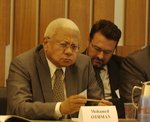
all the session in: bilingual original version français english
Mohamed OTHMAN
original version
Two or three things concerning guilty pleas, and then maybe to situate Kambanda also. I think there are two areas of importance in the guilty plea process between the Defence and the Prosecution. One is when you are establishing the agreed facts. There is always tension between the Prosecution and the Defence when you are establishing the agred facts that constitutes the crime in which the person is pleading guilty. And here, of course, within the Tribunal, there is a lesser margin of dropping charges than you have in the American system of plea bargaining. Secondly, of course, it comes to the range of sentences, which, again within (...)A. GARAPON
Thank you. I believe the Kambanda matter has been clarified and I will turn now to the Defence team to respond in respect of acquittals.
-
contribution 11 - Lurquin Vincent

all the session in: version originale bilingue français english
tags
Accused realeasedVincent LURQUIN
transtlated version
Thank you, Chair. Indeed, I might have been a little hard in my statements under situations where one cannot miss being annoyed. But let me respond to Mr. Othman. First of all, why is Mr. Emmanuel Bagambiki unwilling to return to Rwanda? Because the evening of his acquittal, the minister of justice called the Judges as puppets and the Tribunal as a circus. And two events were organised by the regime in Kigali and Cyangugu, and it was learnt subsequently that Emmanuel Bagambiki, in absentia, without contacted him was convicted by Rwandan authorities to life sentence. So you would understand in the circumstances that he is unwilling (...)A. GARAPON
I will give the floor now to André Guichaoua.
-
contribution 12 - GUICHAOUA, André

all the session in: version originale bilingue français english
André GUICHAOUA
transtlated version
I would like to add a word to the Kambanda case to set the record straight in respect of the occurrence of that event and in respect of the functioning of the Tribunal. I believe that it is worth recalling that at the end of the ’90s, the structure wasn’t the same. There was quite a lot of improvisation. There were difficulties in respect of archiving and other matters. And in the conflicting systems, there was there were there was more to it than conflicting systems. And let me add another point. At the time let me I am sorry to put it this way: Some people wondered about the relevance of his testimony. And when one (...)A. GARAPON
Thank you. I think we have put the cart before the horse by looking at the fate of the acquitted persons.
Before that, we probably need to talk about the plight of persons in detention and the lessens to can be drawn from what you have learned in respect of detention in such a special Tribunal.
Mr. Guindo, commanding officer of UNDF.
-
contribution 13 - GUINDO Saïdou
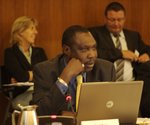
all the session in: version originale bilingue français english
Saïdou GUINDO
transtlated version
Thank you, Chair. My name is Saidou Guindo. I am the commanding office of the United Nations Development Detention Facilities since 1999 at the ICTR. Therefore, I manage the the detention facility which holds all the persons presumed to be guilty or those who are prosecuted by the ICTR. Therefore, I enforce the law. Well, I did it on purpose. I was just trying to tease the lawyers. And these are presume persons presumed innocent, not guilty. That said, we started from nothing, ex ^nilo, at the ICTR to build a detention facility conforming to the expectations and standards of the United Nations and the standards of the (...)A. GARAPON
Very well. I believe Aicha Condé had raised her hand to speak.
-
contribution 14 - CONDÉ Aïcha
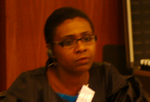
all the session in: version originale bilingue français english
Aïcha CONDÉ
transtlated version
Yes. I had asked to take the floor. I am sorry. I wanted to backtrack to what was said this morning because I find it sad that the Judges were last to take the floor and that we were unable to respond. It is pretty sad. And since this afternoon’s topic relates to judgement, I would like to avail myself of this opportunity to say one or two things. The trial is ongoing. We are required to submit our briefs in a short time limit. And I remember that I had to wait for 12 months after I was asked to tender my brief for the judgement. I know, Your Honours, that you have many trials to handle while I was required to submit my brief (...)A. GARAPON
Thank you very much. We do not really want to leave this issue.
-
contribution 15 - DIENG Adama
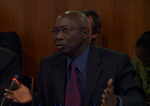
all the session in: version originale bilingue français english
tags
Accused realeasedAdama DIENG
transtlated version
Thank you, Chair. Let me quickly state that it is sad that my dear friend Lurquin has stood by his statement albeit the fact that O’Donnell was in charge of acquitted persons and he did make tremendous efforts so as to ensure that the stay of the acquitted persons would be pleasant. As he said himself, he might have used too hard words. As well as O’Donnell, I believe, when he said luxurious. I beliece he was trying to positivize what Defence counsel had said. Contrary to what has been said, if I recall rightly, I do not believe to have stated that their conditions of living were below the minimal standards. I had said in public and (...)A. GARAPON
Thank you very much. So I think Mr Vandermeersch wants to talk about detention. So I may give the floor first to Mrs Arbia and then afterwards we will go back to the issue of detention. Silvana Arbia.
-
contribution 16 - ARBIA Silvana
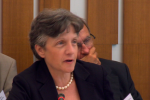
all the session in: version originale bilingue français english
Silvana ARBIA
transtlated version
I would simply like to say that what Adama has said is not only a prospect, but it is already there. Last year when there was a decision to acquit Lubanga, so far we have not found any State willing to receive him. So he is in limbo. So I would like to say how difficult it is sometimes for the Prosecutor and the Defence to find a midway, especially to reach a plea bargain, because when somebody is suspected or convicted for genocide, it is difficult for the convict to be rehabilitated in the future. And this is not taken care of in international criminal (...) -
contribution 17 - VANDERMEERSCH Damien

all the session in: version originale bilingue français english
tags
Preventive detentionDamien VANDERMEERSCH
transtlated version
Let me revisit the issue of preventive detention. I believe that one of the negative records of the ICTR is the lack of control over the length of preventive detention. Sometimes, under the Belgian investigations, I had to place two bourgmestres of the Butare préfecture in detention: Mr. Kanyabashi and Mr. Ndayambaje. That was in 1995. Those two cases were dealt with by the ICTR, and those persons were transferred under detention in 1996 to Arusha. Let me note that 14 years after the warrant of arrest was issued, they have not been tried. I must point out that they are presumed to be innocent. And as a judge, I am shocked to note (...)A. GARAPON
Francois Roux and Everard O’Donnell later.
-
contribution 18 - Roux François

all the session in: version originale bilingue français english
tags
Preventive detentionFrançois ROUX
transtlated version
Since we mentioned civil a while ago, let me state that before the Cambodia Tribunal, the maximum preventive detention time is three years; that is, if after three years the trial has not commenced, examining magistrates are bound to release the suspects. And if the proceeding has commenced, that decision rests with the Chamber. In the civil law system, I wonder if you would have a case as long as the Butare case. To respond to Silvana Arbia, I would like to say that in respect of pleas of guilty which I refer to, none of the two persons whom I stood for in the pleas of guilty were not convicted. I have not defended any ^genocidaere. (...) -
contribution 19 - O’DONNELL Everard

all the session in: bilingual original version français english
tags
Preventive detentionEverard O’DONNELL
original version
Well, I suppose I could reply to everything, but it would be unnecessary. I will leave that to Guindo to deal with the specific issues. I’ll just say that that path, that dirty path, is one that I use every time I go into the UNDF. Sometimes people come from the perfumed gardens of Europe and from North America and they somehow think that when conditions in East Africa are offensive to them that this is somehow sometimes our fault, particularly dirt or anything you like. You only have to go 50 metres from the UNDF into the Tanzanian prison to know what prison conditions really can be like in East Africa. I had to explain this to the (...)A. GARAPON
Adame Dieng, just before the break. Before maybe, Mr. Guindo.
-
contribution 20 - GUINDO Saïdou

all the session in: version originale bilingue français english
Saïdou GUINDO
transtlated version
Thank you. I don’t want to open a controversy here with Barrister Roux. Well, if one runs a detention centre, there is a minimum amount of security to provide, and these security measures that we establish are meant to protect the inmate, but also to protect ourselves and the visitors that come. It has happened, as I said, that counsel or members of the Defence team because when I say members of the Defence team, I am referring to the lead counsel, the co counsel, who are protected and who endure a number of privileges. But, in addition to them, we have investigators who are recruited. They may have family ties with the accused (...)Thank you. Fifteen minutes of break before we move on to other issues.
(Recessed at 3.45 pm.)
-
contribution 21 - GARAPON Antoine

all the session in: version originale bilingue français english
Antoine GARAPON
transtlated version
(Session resumed at 4.10pm) So please sit down. Take your seats. I will wait for everybody to be seated before resuming our deliberations, which will be the last session for this afternoon. I believe there have been major issues that have been raised. I’m not referring to the dirty roads and the undue delays in custody. If we were to focus exclusively on the dirty wet roads, there would be a fundamental issue. As Everard O’Donnell said, namely, the length of pre trial detention, which is a problem in every judicial system and which also afflicts the ICTR, which doesn’t have a counterweight akin to the European model of the court of (...) -
contribution 22 - EBOE-OSUJI Chile

all the session in: bilingual original version français english
tags
Preventive detentionChile EBOE-OSUJI
original version
Thank you very much, Mr. Chairman. I just wanted to speak after Mr. Everard spoke on the matter of pre trial delays. I, first of all, begin with agreeing with his proposition that it’s all a matter of context to do this thing, all these assessments of efficiency, speed and all that. I also agree with his thesis that, as demonstrated in his own intervention, that one could hear him, but we are sometimes our own worst critics. He clearly demonstrated that. But I need to return to the proposition that it’s all a matter of context. And I would love to stayed with that in the analysis of the speed and the speed of trials and the pre trial (...)A. GARAPON
Thank you. And I believe that it is quite a problem for national jurisdictions, and you are right in underscoring that they are the easiest to be resolved by national courts. And I also believe, to the credit of the ICTR, that the same apply to the ICTY, as to the need to improvise in a setting which was not as ideal as previous international courts like Nuremberg. And that is the reality. Nuremberg took place in ideal conditions. The war was over. The records were available. And that ideal Nuremberg setting would never be found. We have the records, we don’t have the people. We have the records, the war is still raging, where you don’t have the records but you have the people. So I believe that the assessment in international justice was truncated, because it was promised on Nuremberg, which was a pretty typical model, while ICTR and ICTY encountered the difficulty of delivering justice in real time, which has to step on international relations and the political violence of international relations and which further complicates the matter in the various contributions which I received. To come back to our discussion, there is Thierry, who is a keen observer of the work of the ICTR. Thank you.
-
contribution 23 - CRUVELLIER Thierry
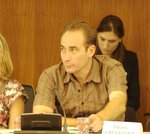
all the session in: version originale bilingue français english
Thierry CRUVELLIER
transtlated version
Thierry Cruvellier is my name. I do not want the discussion to focus on detention matters only, but I’m only lay emphasis on that point. Where our people are still hesitant in addressing the issue of the length of detention, I believe that we are like ducking an issue which will be a blemish on the record of the ICTR and that will be the worst record of all courts set by the ICTR. It has been said that you have persons who have been remanded in custody for 14 years, and you have about 15 other defendants who spent at least ten years or more before their judgements are delivered. And there is nothing equaling that record. And I (...)A. GARAPON
Thank you very much for highlighting the link between history and justice. And this is significant because justice cannot operate in abstraction. It occurs within a specific history. And on that note, I will give the floor to Prosper.
-
contribution 24 - PROSPER Pierre-Richard

all the session in: bilingual original version français english
Pierre-Richard PROSPER
original version
Thank you, Mr. Chairman. I just want to challenge my friend Thierry’s point regarding the sentences. The interesting thing about an international tribunal is that we all come in with our unique experiences, our cultural differences and our different legal cultures as well. I think your comment regarding that the sentences are too harsh is based on you coming from your perspective, which is more of a European perspective, where, I think, the sentences are generally more lenient than, for example, in the United States and other parts of the world. We are dealing with genocide where people are responsible for deaths of thousands of people. (...)A. GARAPON
Several persons want to have the floor. President Byron, then François Roux and François-Xavier Nsanzuwera.
-
contribution 25 - BYRON Dennis C. M.

all the session in: bilingual original version français english
Judge BYRON
original version
Thank you, Mr. Chairman. I was reminded by your invitation to give to the floor the statement made by my learned and distinguished colleague, Judge Arrey, because I had pulled back my hand with an intent to withdraw my request. I really had intended to just make a brief remark really on the issue of sentencing, because I thought that the intervention did contain some misstatements. The rules of the ICTR clearly provide for a regime which would permit commutations, pardons and various other forms of attenuation of the sentences of persons severing prison sentences. And, in fact, the very last person who was released who had, in fact, (...)A. GARAPON
Francois Roux asked for the floor. Francois Roux and after that Francois Xavier Nsanzuwera.
-
contribution 26 - Roux François

all the session in: version originale bilingue français english
François ROUX
transtlated version
Yes, of course. First, I would like to reassure Mr. O’Donnell, because it would appear that both of us were using that footpath illegally to get to the UNDF but since Guindo has told me that the problem will be addressed now, O’Donnell, we can now use the main entrance. You see, that is a tangible result. Now, on sentencing and prison terms, I just want to make a few comments. The first is that we can compare the sentences at the ICTY to those at the ICTR, and we observe that considering the length of sentences, those of the ICTY are always shorter than those of the ICTR. That is an observation and they are almost equivalent (...) -
contribution 27 - NSANZUWERA François-Xavier
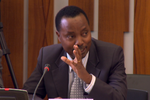
all the session in: version originale bilingue français english
François-Xavier NSANZUWERA
transtlated version
Thank you, Mr. Chairman. I wanted briefly to react to the issue that was raised by Prosecutor Muna this afternoon and also to what Thierry said a while ago on the history of the genocide. Mr. Muna’s question this afternoon as to whether the Tribunal has attained the objective of reconciliation in Rwanda I felt challenged as a Rwandan and especially someone who experienced the genocide from inside. Contrary to other participants, I felt a cloak of pessimism. I may feel that I am the most pessimistic person in this hall because I feel that the worst is behind me, so I’m really I’m quite optimistic among you. I think the worst is (...)A. GARAPON
Thank you, Francois Xavier, for your contribution, which actually takes us to the future, the far future of our children and of history that remains to be written, given that what history has also taught us over the past 50 years is that history is a continuum. It is a continuous writing process that is never finished.
Mohamed Othman has the floor now.
-
contribution 28 - OTHMAN Mohamed

all the session in: bilingual original version français english
Mohamed OTHMAN
original version
One of the issues that was raised was about the whole question of pre and post custody trial delays and the actual delays in the model of criminal justice. I don’t think that we necessarily must accept that the Arusha model is a model that seconds delayed justice. There are a number of reasons why I say so. I think that, as a premise, we cannot, coming from different background, human rights and so on, accept that international criminal justice is a delayed model of delivering justice. For a number of reasons. I think we must accept that international criminal justice offers the highest standard of criminal justice but not that it (...) -
contribution 29 - MUNA Bernard Acho

all the session in: bilingual original version français english
Bernard MUNA
original version
Thank you, Mr. Chairman. I was just listening to my eloquent speaker of my friend Mr. Roux when he was talking about when he sees an accused persons, he sees a human being. I think we all see the same, but when we put the work of the Tribunal, in fact, these crimes are called crimes against humanity. They are crimes against humanity. The human species is under attack. Crimes against humanity. So we can say, as I said before, that the human society is a party to the trial. Most of times we ignore the consequences or the acts of genocide and other crimes to the society where these crimes happen, and the part of the society is (...)A. GARAPON
Thank you very much. I have a number of speakers. Vincent Lurquin, Silvana Arbia, James Stewart. So, please, I will ask you to be brief since we are running out of time
-
contribution 30 - Lurquin Vincent

all the session in: version originale bilingue français english
Vincent LURQUIN
transtlated version
Yes, very briefly and related to what you said in your introduction. I’m following up on what Francois Xavier Nsanzuwera. He said that those who write history are the witnesses, Prosecution and Defence witnesses, but we need records of those witnesses. Initially you asked about the records. Are there guarantees about the records? Does history could be written thanks to these records? -
contribution 31 - ARBIA Silvana

all the session in: version originale bilingue français english
tags
Prosecution strategySilvana ARBIA
transtlated version
I will try to be very brief. Now, concerning Butare, as somebody said, it be cited as an example of dysfunction. I may accept that theory, but I have evidence to the contrary. Now, there are six accused persons in the same trial and that was a strategy, that is, a joinder or no joinder. The only practical problem, not legal but practical, if we have to do single cases for all six, you have to find six chambers, with six benches to try all the six at the same time, so it could take quite some time too. So if you consider that, then the Butare case, even though it was very long I may not get into the detail, but it was suspended or (...)A. GARAPON
Well, when a life sentence is handed down, who will manage it after the Tribunal closes down? What are the jurisdictional problems here?
-
contribution 32 - STEWART James
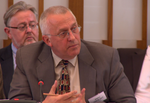
all the session in: version originale bilingue français english
tags
Historical legacyJames STEWART
transtlated version
Mr. Chair, I don’t want us to close this discussion without highlighting the importance of reviews, and it is mentioned in the programme. I would simply like to highlight this point of reviews. I started working in the cases before moving on to the Appeals Chamber, and I realised that there were different types of appeals, interlocutory appeals and post judgement appeals. And interlocutory appeals are very important. And the most important to me was the decision taken by the Appeals Chamber in respect of judicial notice of the genocide of the Tutsi in 1994 in Rwanda, because that ruling, which was not warmly welcome in the detention (...) -
contribution 33 - Haguma Jean

all the session in: version originale bilingue français english
Jean HAGUMA
transtlated version
I agree with ^Francois when he says that the decisions delivered by the ICTR may contribute to national reconciliation in Rwanda, despite the number. Although they are few in number, I mean the decisions, notwithstanding the length of time, which is understandable, but I believe that they can contribute to national reconciliation. What is essential is the vision of achieving national reconciliation. The rest is a process. It is a process, and I believe we can achieve national reconciliation. Coming to national reconciliation specifically, my learned friends have mentioned the daunting difficulties facing persons who have pled (...)A. GARAPON
I would like to ask everybody to be as brief as possible when they take the floor.
-
contribution 34 - HASKELL Leslie

all the session in: bilingual original version français english
tags
ReconciliationLeslie HASKELL
original version
I’m glad that Mr Haguma has brought the discussion back to reconciliation. I suppose I should feel very inspired by what Francois Xavier and Maitre Haguma have said in terms of national reconciliation and what the ICTR has done for people on the ground in Rwanda. Unfortunately, I don’t share the same view. I’ve been on the ground now for two years there and have really had an opportunity to look at the question of what the impact of trials at the ICTR has been within the country, in some of the more remote places. And, frankly, I think there are lessons to be learned from that, and I’m not sure that they have been learned in what we’ve (...) -
contribution 35 - MPATSWENUMUGABO Alphonse
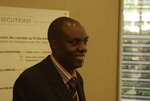
all the session in: version originale bilingue français english
Alphonse MPATSWENUMUGABO
transtlated version
Thank you, Chair. I would like to revisit what Francois Xavier said a while ago in respect of the genuine history of the genocide which will be written by the witness who testifies before the court. And this morning I did mention that in my paper, about working relations between the parties, namely, the Prosecution and the Defence. And, indeed, I would like to subscribe to the views espoused by François. But, two, for the purpose of the legacy to be bequeathed by this Tribunal to the Rwandans we have to keep a record of testimonies borne by witnesses speaking Kinyarwanda. Those of us Kinyarwanda interpreters in the heat of the (...)A. GARAPON
And it will be all the more important for historians who can only work on raw data and which are most faithful to reality. As speakers, we have Thomas Kamilindi, then Réné Degni-Ségui. So, Thomas Kamilindi first.
-
contribution 36 - GARAPON Antoine

all the session in: version originale bilingue français english
tags
ReconciliationThomas KAMILINDI
transtlated version
During the topic impacts of judgement and sentencing, I would like to highlight something which has not been covered at all, and it is the emotional and psychological impact of a judgement. During the genocide and this is a personal testimony. At the time of the genocide I was a refugee I took refuge in a hotel in Kigali which has become a famous hotel, namely, the Hôtel Mille Collines. I am not a intellectual, but I’m not also a layman. But despite the little education I have acquired, during the genocide what I witnessed, in fact, I saw these killers like gods of evil like untouchables. I didn’t believe one second that justice (...)A. GARAPON
Thank you for your testimony. Professor Réné Degni-Ségui.
-
contribution 37 - Degni-Ségui René
all the session in: version originale bilingue français english
René DEGNI-SÉGUI
transtlated version
Thank you, Mr. Chair. I’m a former special rapporteur. I had, as an observer, refrained from speaking but Francois Xavier’s emotional statement is a cause of concern to me, because it stands midway between Nuremberg and the Royal Palace. Nuremberg happened yesterday, and I have just two questions. Just yesterday we dwelled at length or we spoke at length and we said only those who had been presumed guilty of committing the genocide had been tried, but the others were left aside. I wonder if reconciliation can be achieved if we only see or if it is not construed as justice for the victors. I am afraid that it would undermine (...)A. GARAPON
Thank you, Mr. Rapporteur. I would like to give the floor now to Mr. Nsengimana.
-
contribution 38 - NSENGIMANA Nkiko
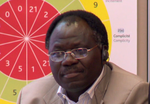
all the session in: version originale bilingue français english
Nkiko NSENGIMANA
transtlated version
Thank you. I had agreed with Joseph Ngarambe that he will take the floor before me, but I will take the floor first. Thank you, Chair. I will not belabour the point raised by Mr. Degni Segui. I believe it is very important. It is central. Namely, that all victims have to be identified and acknowledged. And I did not say or I believe I am more optimistic than Nsanzuwera, but I do not see any reconciliation if we stop halfway, and the Tribunal would not take any pride if it is unable to actually acknowledge all the victims and to try the main culprits irrespective of their leaning. But I would like to address another issue of (...) -
contribution 39 - NGARAMBE Joseph

all the session in: version originale bilingue français english
tags
ReconciliationJoseph NGARAMBE
transtlated version
I will try to be as concise as possible in my statement, especially as my fellow countrymen have taken the wind out of my sail. And I agree with my compatriot when he states that the hangmen of 1994 took themselves as gods, and they believed they would go in impunity after committing those crimes. But today we are satisfied. The number doesn’t matter. Some 30 or so have been tried. Irrespective of the circumstances, it is a strong signal. It is a source of appeasement. But the road is still long, the road to reconciliation. Do we have faith in the future in Rwanda? We have concerns, because if the signal that has been sent by (...)A. GARAPON
I have only three statements to take before we move on to the tribute to Alison Des Forges. I have Adama Dieng, Amoussouga and Ms. Fadugba.
Briefly, please.
-
contribution 40 - AMOUSSOUGA Roland

all the session in: version originale bilingue français english
tags
ICTR assessmentRoland AMOUSSOUGA
transtlated version
Very briefly, I would like to go back to what was said about the capacity of the ICTR to communicate its work in Rwanda and to share with the Rwandan people all what we are doing. And in that area the ICTR set up a programme known as the outreach programme, and that programme was beefed up and it helps to build the capacities of judicial actors and the civil society in Rwanda. Recently, we received support from the European Union that helped us to set up about ten information and documentation offices in the ten provinces of Rwanda to reflect the major office we have in Kigali called the Umusanzu Center. We also have intinerant teams (...) -
contribution 41 - DIENG Adama

all the session in: version originale bilingue français english
Adama DIENG
transtlated version
Now, what happened in Rwanda in 1994 was a crime against humanity. This has been said several times, which means that the efforts made by these African countries need to be commended. I must say that Mali, one of the poorest country, has worked a lot and contributed with its own budget to improve the detention conditions of our convicts. Having said that, I do agree with Mr. Haguma when he says that Rwanda has built a modern prison, and I know with the help of the Netherlands. And I may say it is not impossible, as Mr. Amoussouga said, it is something that falls within the exclusive remit of the President. But you know the (...)A. GARAPON
Thank you. Last speaker, Mrs. Fadugba.
-
contribution 42 - FADUGBA Ayodedji
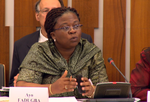
all the session in: bilingual original version français english
Ayo FADUGBA
original version
When we talked about public information, I was looking at my colleague Mr. Amoussouga to see whether he wished to speak to address the efforts being made by the Tribunal in Rwanda. That’s why I had raised up my hands, to say that we have the infrastructure in Rwanda and Rwandans have to take the step of looking at the information and using it for national reconciliation. But the structure is there. Thank you.A. GARAPON
Thank you all. Thank you all for the quality of your statements which has enlivened and enriched this discussion. I now give up my chair to André Guichaoua. He will give you information about the tribute to Alison Des Forges planned tonight and attended by Roger Des Froges, her husband. Thank you.
(Session recessed : 5.40pm)

